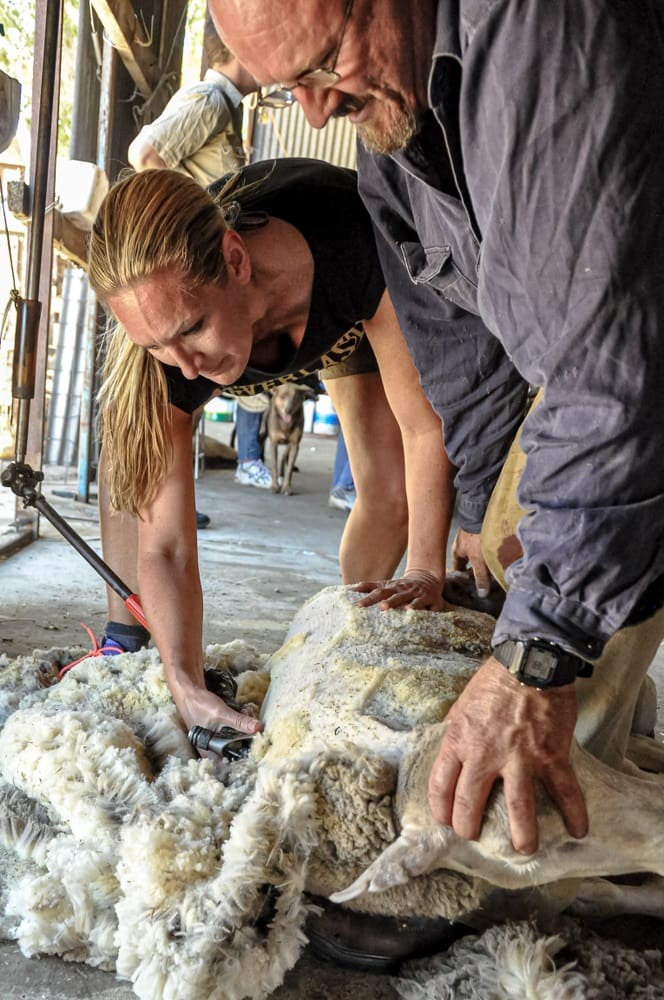
Learning to shear at Eneabba in Western Australia.
A PROJECT aimed at redesigning training programs for shearers, wool classers and shed hands will hold in-person consultation workshops across Australia next month.
Industry-led jobs and skills council Skills Insight is working with industry in the project to improve skills and training for shearers, wool handlers and classers.
Throughout May, webinars and consultation workshops will take place across various locations to collect feedback and draft qualifications, skill sets and units will be made available on the Skills Insight website for broad stakeholder consultation and feedback.
Site visits have been undertaken and a technical committee established to guide the initial development of draft units, skill sets and qualifications.
The project’s technical committee has already identified opportunities to develop a new wool harvesting skill set, has identified the need to incorporate the skills associated for working with traceability and integrity schemes and to strengthen health and wellbeing in existing units of competency.
The technical committee is also particularly interested in hearing feedback on qualifications and units identified for possible deletion, as the committee believes they may no longer align with the current skill requirements of industry. Feedback on existing or potential use of the qualification and units is being encouraged.
- AHC33116 Certificate III in Advanced Wool Handling, Opens in new tab
- AHCSHG306 Carry out post-shearing procedures, Opens in new tab
- AHCSHG402 Conduct equipment experting for machine shearing, Opens in new tab
- AHCWOL101 Support woolshed activities, Opens in new tab
- AHCWOL402 Use individual fleece measurements to prepare wool for sale
Shearing Contractors Association of Australia chief executive Jason Letchford said SCAAA, along with other industry bodies, is involved in the consultation process being run by Skills Insight to review update six qualifications and 34 units relating to shearing, wool handling and wool classing.
Mr Letchford said the thorough review process is important and welcomed by all sectors of the industry.
“The process will help fine tune the education and skill outcomes of new and existing workers, that will better meet the needs of industry,” he said.
“Improved skills make employees more productive, which in turn leads to higher incomes for industry workers and therefore makes the industry more attractive to new entrants and so on.”
Feedback is encouraged throughout this project to review and update six qualifications and 34 units to better reflect the skill level of the tasks described and the skills required by industry.
In-person consultation workshops will be held at:
Dubbo, New South Wales – Saturday 4 May
Wagga Wagga, NSW – Monday 6 May
Hamilton, Victoria – Monday 13 May
Naracoorte, South Australia – Tuesday 14 May
Longreach, Queensland – Saturday 18 May
Campbell Town, Tasmania – Tuesday 21 May
WA (location and date to be confirmed)
Two online sessions will also take place and all sessions are in AEST.
For more information, register for a workshop or subscribe to updates visit the project page.
To receive updates about Skill Insight’s projects, subscribe to the Skills Insight newsletter.

The shearing/wool handling schools have always been great initiatives. The problem as I see it is when the learner shearer gets out into the world of real shearing there is no back-up or mentoring. The little, straight sheep at the schools are very different to a lot of Merinos.
I think every sheep district should have experienced respected shearers who are paid for their time, and that go around to the sheds where the learners have a pen, to mentor them to the next level. This would help to keep the upcoming shearers on track and in the trade.
The actual training seems to be good, with graduates of the training ready to start in the industry or equipped with better skills if they’ve done improver training. The problem in the industry seems to be retention.
Is this the selection criteria of participants selected or what? Locally, we had one training course for refugees. There are heaps of government money for this, if the gossip is to be believed. To the best of my knowledge none were working in industry twelve months later. Some training courses have been really poorly promoted and advertised. Maybe these comments are not on the mark, but shearer training is really ‘secret squirrel’ stuff with only the good news heard directly.